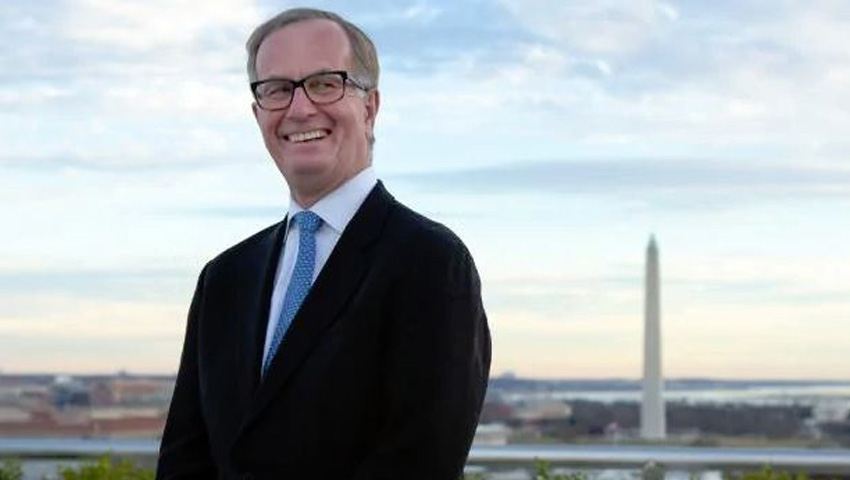US ambassador to Australia, Arthur Culvahouse, has called on the nation to embrace a ‘great power’ role invested in maintaining the enduring stability and prosperity of the region amid growing debate about the future direction of Australia in the Indo-Pacific.
To continue reading the rest of this article, please log in.
Create free account to get unlimited news articles and more!
The nation is defined by its relationship with the region, with access to the growing economies and to strategic sea-lines-of-communication supporting over 90 per cent of global trade, a result of the cost effective and reliable nature of sea transport. Indo-Pacific Asia is at the epicentre of the global maritime trade, with about US$5 trillion worth of trade flowing through the South China Sea and the strategic waterways and choke points of south-east Asia annually.
Enhancing Australia's capacity to act as an independent power, incorporating great power-style strategic economic, diplomatic and military capability serves not only as a powerful symbol of Australia's sovereignty and evolving responsibilities in supporting and enhancing the security and prosperity of Indo-Pacific Asia – shifting the public discussion away from the default Australian position of "it is all a little too difficult, so let's not bother" will provide unprecedented economic, diplomatic, political and strategic opportunities for the nation.
Recognising the changing geo-political and strategic realities of the Indo-Pacific, Washington's new ambassador to Australia, Arthur Culvahouse, has kicked off his term with a challenge for both the Australian government and the Australian people, calling for the nation to play a significantly increased role, as a regional 'great power'.
These calls come as the US faces an increasingly contested world order - with the traditional guarantees of the US primacy now under the threat, prompting Washington to actively begin prodding allies to take a greater role in securing not only their own economic, political and strategic interests, but also more directly engage in efforts by the US to effectively sustain the post-Second World War order.
For Australia, this prompt was outlined by Culvahouse in an interview with The Australian, saying, "We think the natural course is the Australian government, as it goes forward, will be even more supportive of US policy in the Pacific and that may include calling out malign influences where they see them."
This is particularly timely as a number of Australian strategic policy experts begin to debate the longevity of the unrivalled US power and the enduring legitimacy of the Australia-US Alliance in a contested environment and the next course of action for Australia as a nation.
It is important to recognise that for the first time America has a true competitor in China – a nation with immense industrial potential, growing wealth and prosperity, a driving national purpose and a growing series of alliances with re-emerging, resource-rich great powers in Russia, and supported by a growing network of economic hubs and indebted psuedo-colonies throughout the Indo-Pacific and Asia.
Unlike the Soviet Union, China is a highly industrialised nation – with an industrial capacity comparable to, if not exceeding, that of the US, supported by a rapidly narrowing technological gap, supporting growing military capability and territorial ambitions, bringing the rising power into direct competition with the US and its now fraying alliance network of tired global allies.
The increasing cost blow outs and project delays of major US defence acquisition and development programs, including strategic programs like the F-35 Joint Strike Fighter, the Gerald R Ford Class of aircraft carriers, B-21 Raider strategic bomber, combined with ballooning US government debt and domestic political and societal challenges, serve as unique and important challenges, limiting America's enduring ability to project presence.
Whether consciously recognising the potential of this challenge or not, the US President's direct, often confrontational approach towards allies belies domestic concerns about America's ability to maintain the post-Second World War global order. Andrew Davies of the Australian Strategic Policy Institute (ASPI) highlighted the importance of recognising the limitation of US power in a recent piece for ASPI, saying, "The assumption of continued US primacy that permeated DWP 2016 looked heroic at the time. It seems almost foolishly misplaced now."
Culvahouse's calls for greater Australian involvement and capacity as a 'great power' were echoed by Hugh White of the Australian National University, who called for increased Australian defence expenditure – heading toward 3.5 per cent of GDP as an immediate priority for the Australian government in order to mitigate any potential decline in the capability or indeed, willingness of the US to intervene and provide and enduring strategic capability in the Indo-Pacific.
Defence Minister Linda Reynolds expressed similar sentiments recently, saying, "Australia will always identify with rules-based systems and work actively to support them. This does not mean – and let me be clear about this – this does not mean that we want to preserve the past as a way of shaping the future, far from it. For rules are strengthened by being adapted to new realities. New rules also need to be written, especially in relation to potentially disruptive technologies that have advanced faster than have regulations governing their use."
Get involved with the discussion and let us know your thoughts on Australia's future role and position in the Indo-Pacific and what you would like to see from Australia's political leaders in terms of increasing both the budget and manpower available to the ADF in the comments section below, or get in touch with
Stephen Kuper
Steve has an extensive career across government, defence industry and advocacy, having previously worked for cabinet ministers at both Federal and State levels.

 Login
Login








